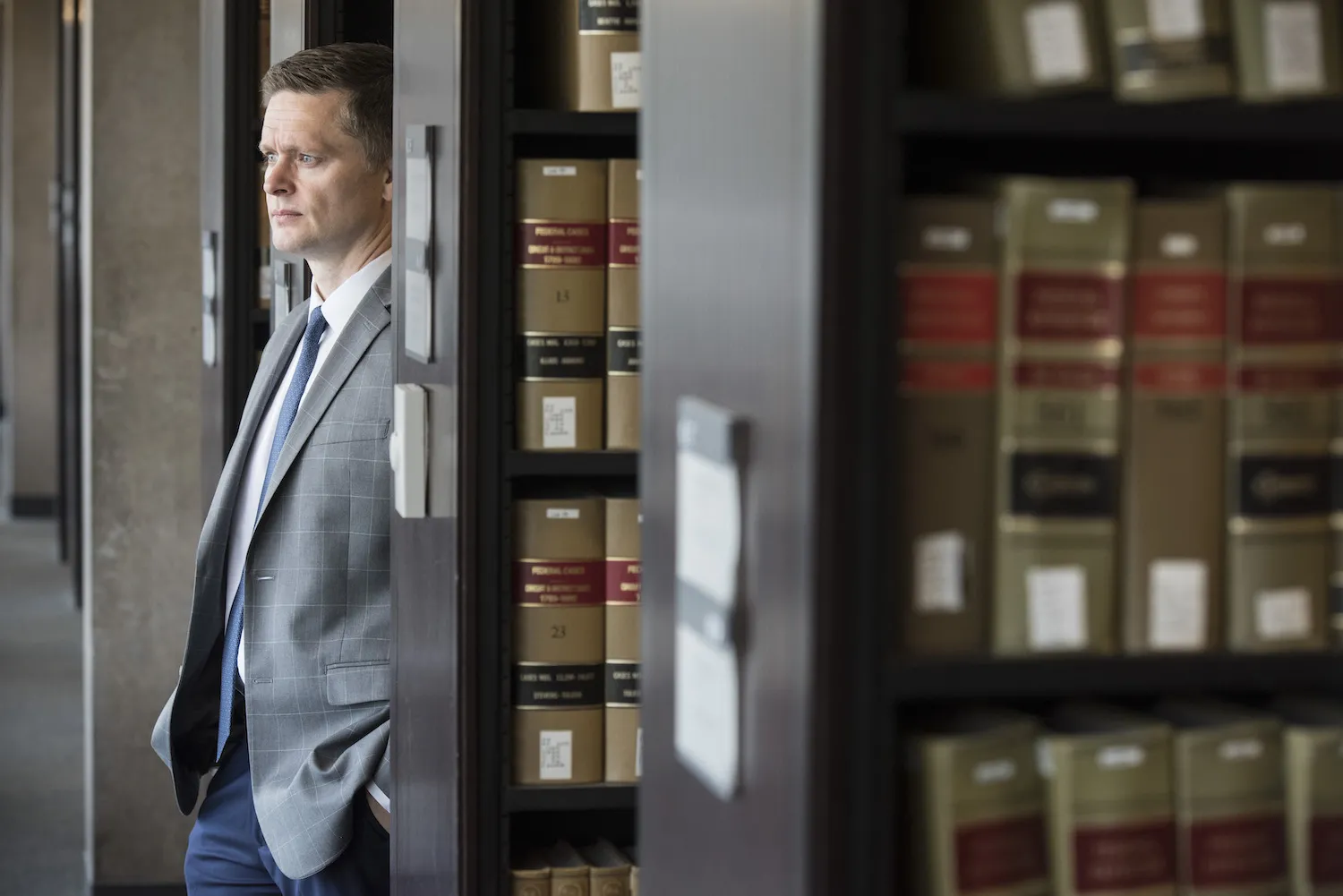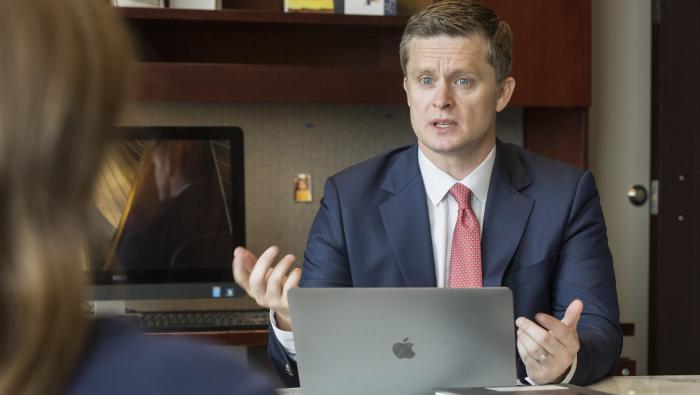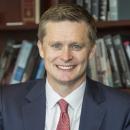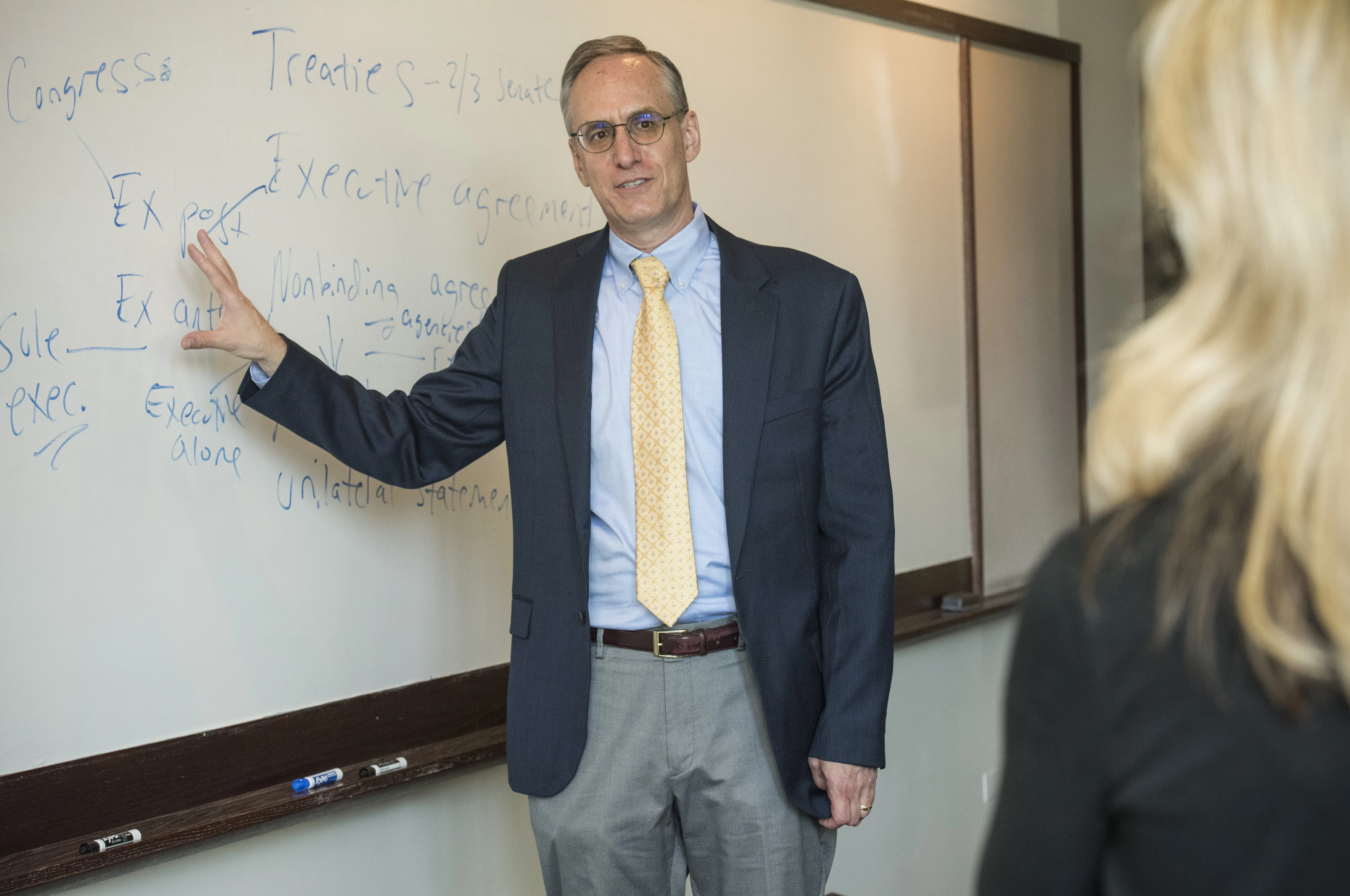Where Research Meets the Real World

Professor Anthony Casey had just launched the Law School’s Center on Law and Finance when the COVID-19 pandemic struck in early 2020. He had two events in the works: an in-person conference on judicial valuation and another on international insolvency; the valuation conference, scheduled for March 2020, was supposed to be the Center’s public debut.
As Casey, the Law School’s Donald M. Ephraim Professor of Law and Economics and the Center’s faculty director, postponed the conferences, he wondered: What now? What will we do if we can’t hold these two events? More than a year later, he has his answer: Hold nearly a dozen virtual events instead—some drawing more than 100 people—and build a robust following that could outlast the pandemic.
“The silver lining, of course, turned out to be that you can do virtual events on shorter notice and with a broader audience,” said Casey, ’02, who practiced corporate bankruptcy, merger litigation, and complex class actions at law firms before launching his academic career in 2009 with a two-year Bigelow Fellowship at the Law School.
In its first year and a half, the Center on Law and Finance drew national audiences with panel discussions that explained and explored timely topics like the GameStop controversy and the Caesar’s Palace bankruptcy, offered a platform to emerging scholars, and dispensed advice to students eyeing law and finance careers. It helped jump-start the national conversation about race and business law with two academic workshops and coordinated a project in which Casey and two colleagues led 14 Law School students in developing investor advocacy proposals to be presented to the US Securities and Exchange Commission.
Casey, who joined the full-time faculty in 2011, had long sought to connect scholars, students, and practitioners in the field of law and finance. In 2019, with the fast-growing field facing increasingly complex questions, he proposed the Center to foster an interdisciplinary dialogue and create space for new ideas to percolate.
The University of Chicago, he knew, was the ideal host. In recent years, the Law School—already known as the birthplace of law and economics—has expanded its law and business offerings to include both three-year and four-year JD/MBA programs in partnership with the University’s Booth School of Business; a certificate-granting Doctoroff Business Leadership Program, also with Booth; clinical programs devoted to corporate law, innovation, and entrepreneurship; a first-year Transactional Lawyering class; and a new student-edited business law journal.
“You don’t want to be this siloed academic place where you think of ideas and they never go anywhere—and Chicago has never been that,” Casey said. “We have always been about making an impact.”
In an interview this summer with Becky Beaupre Gillespie, the Law School's director of content, Casey reflected on the Center’s successful debut, discussing its contributions to the field, the shift to remote platforms, and plans for future events. The conversation has been edited for length and clarity.
Gillespie: What is the driving mission behind the Center on Law and Finance, and who are you seeking to reach?
Casey: Our goal is to bring the Law School’s cutting-edge law and finance scholarship into the real world and to bring the real world into the research. In any academic endeavor, you want your work to have an impact, and in the field of law and finance, that means knowing what’s going on in real cases and real deals. And those are driven by the lawyers in the field, the finance professionals in the field, and the judges who are hearing cases and disputes. So we have several target audiences: we want to connect Law School professors and students with the practitioners who are doing this day to day, and—in addition to engaging students who already know they are interested in law and finance—we want to reach out to those who don’t know which fields of practice interest them but who might find that they really enjoy engaging with these topics.
“[W]e’re a holistic endeavor that involves not just faculty, not just students, not just lawyers, but all of them together.”
Professor Anthony Casey
Gillespie: Was this something that was missing—a center that spans audiences and goals in this way?
Casey: There was a big need, which ultimately is why I proposed the Center. There are other business law centers out there, but they do not target this broad connection between scholarship and practice. We are unique because we’re a holistic endeavor that involves not just faculty, not just students, not just lawyers, but all of them together. The communication moves in two directions: If I have a law review article that explores, say, a cutting-edge idea about how bankruptcy court should deal with a certain type of case, I want to get it into the hands of lawyers and the judges who are thinking about that type of case. We not only want the research to be informed by real-world cases, we also want the research to be useful to practitioners. Research is less powerful if it isn’t informed by the real world, and it is less influential if nobody sees it. So we want to get everyone together.
To be clear, that includes students—the future lawyers in the field. And student demand for our events has been through the roof. When we announced the opportunity to pitch ideas to the SEC, we had a lot of students who wanted to sign up. Our events that focused on which classes you should take to prepare for a career in finance or business law have been hugely popular, too.
Gillespie: The Law School has expanded its business law offerings in recent years with the Doctoroff Business Leadership Program, the accelerated JD/MBA program, and the recent addition of the student-led Chicago Business Law Journal. What is driving this growth, and how does the Center fit the growing suite of opportunities?
Casey: The Law School has always been a place where the best scholarship on business law and finance is being produced, and we’ve always had students entering those careers. But in the last decade, those careers have become more and more specialized. [Employers and clients] want lawyers who can think about the financial aspects of a deal or a bankruptcy case or a merger litigation. So there’s a demand for people who know both law and finance. Not everyone wants to enroll in a full-fledged JD/MBA, though, so it is important to have various ways to engage with the field and to have multiple points of entry. The Center adds another layer to that. For example, one of our programs is to have student research assistants for the Center—it’s more engagement than, say, showing up to an event, but it’s less of a commitment than getting an MBA or committing to the field at a law firm. It’s a chance to try things out.
Gillespie: One of your most popular events was planned in a matter of days in response to news stories about skyrocketing GameStop shares. You, Todd Henderson [the Michael J. Marks Professor of Law], and Josh Macey [an assistant professor of law] came together on Zoom to explain the controversy, and more than 100 people showed up to watch. Why did you organize it, and why do you think it was such a hit?
Casey: There was immense public interest [in the GameStop story], and so we thought: What better way for the Center to pursue its mission than to have an event where we put forward our ideas and take questions and share what our research tells us about this thing that’s happening right now. It was on Zoom, so we were able to draw people from all over the country on short notice. Afterward, we were getting cold-call inquiries from people who watched the event—including some who weren’t associated with the Law School—and wanted to know more about the Center. They said it was great to engage with the academy about a real-world issue.
We had another event [which also drew more than 100 people] that focused on the Caesar’s bankruptcy. We had the authors of a book on the bankruptcy [The Caesar’s Palace Coup by Max Frumes & Sujeet Indap] as well as four or five of the professionals who were involved in the bankruptcy either on the panel or in the audience. We plan to continue to have more events like these going forward.
Gillespie: Why are these outward-facing events important in addition to ones focused solely on students, faculty, and practitioners?
Casey: It allows us to engage a different audience. In the case of the GameStop event, it was an opportunity to attract people who might not otherwise attend a Law School program on the complexities of publicly traded stock. The field of law and finance is getting more specialized and more technical, but it still affects everybody—you can’t go through the day without this area of law having at least an indirect effect on your life. This event and the Caesar’s event gave the broader public some digestible and accessible versions of what they were hearing about in the media.
Gillespie: Let’s talk about the Securities and Exchange Commission project. You had 14 students who developed investor advocacy ideas during a spring quarter seminar taught by you, Todd Henderson, and Josh Macey. In May, those students presented their proposals to an SEC commissioner and several others via Zoom. How did they do?
Casey: The students were fantastic. They had varying degrees of experience—some were sure they wanted to become securities lawyers, others had taken a securities law class and wanted the opportunity to see how it felt to engage with the field more deeply. At the beginning, they thought about topics and shared those with us. We said, OK, do some research and come back in a week and we’ll give you feedback. When they came back a week later, the presentations were what you might imagine from people who are new to a topic. Fast forward eight weeks, and they were in front of the SEC presenting like seasoned partners at a law firm. It was so impressive.
And if you think about it, that project brought the views of 14 law students to the heads of a major government agency. Now the SEC is thinking about what these 14 law students have to say about securities law and the protection of investors. And that’s a different dialogue than if Todd Henderson and I had met with an SEC commissioner. It can really add to the overall mix of perspectives being considered.
Gillespie: In February, the Center joined forces with the Law and Business program at the University of Virginia School of Law to cohost two academic workshops on race and business law. In one, you discussed race and the teaching of business law, and in the other, you examined how the law interacts with issues of race and business law. These workshops were among the first to address these issues nationally, and they drew many dozens of scholars. How did the project begin?
Casey: The Center on Law and Finance has a Founder’s Committee of supporters, and several of them had highlighted this as an important issue, as did Libby Seguin, the manager for the Center. I was also talking about these issues with Professor Cathy Hwang [’10] at UVA—it was front and center for both of us. Once we started planning, interest among panelists was very high, and audience interest was much higher than anticipated.
Gillespie: What came out of the discussions?
Casey: One discussion focused on what scholars are writing about in terms of diversity in law and finance. We had three panelists who talked about issues we need to address and deal with in society, and they offered ways to think about them. The other workshop was about teaching—how you engage students in the dialogue about race and diversity when teaching about law and finance. It was important to get that conversation started, and the panel was fantastic, offering new ways to think about engaging a classroom. The conversation was both high level and in the weeds. It was: here’s an article you might assign, here’s a case you might assign. But also: here’s what you’re trying to achieve in the class when you bring the lens of diversity to a topic. These were the first events in what we see as a longer-term diversity program. In keeping with the Center’s vision, we’d like to come back with events that engage practitioners who are thinking about how these issues affect their firms and their businesses on a day-to-day level.
Gillespie: The COVID-19 pandemic forced you to execute a major pivot almost immediately after launch. How has the shift to remote formats shaped the Center and the ways in which you engage with your mission?
Casey: It ended up changing the way we look at events. GameStop was a great example—before we pivoted to the remote format I had never envisioned putting on an event on two days’ notice. As we shift back to in-person events, I hope to still have virtual events that allow for a broad audience and shorter planning time in addition to the in-person conferences.
Also, more people know about the Center because of those virtual events, and I imagine we’ll have a more robust dialogue because of that.
Gillespie: Looking back on this first year and a half, what are your proudest accomplishments?
Casey: First, the pivot. I was worried in March of 2020, thinking, “Oh, this is it. The Center didn’t launch.” I wondered what we’d do. By that June, we had several virtual events planned. We could have tried to wait it out—nobody knew how long the pandemic would last—but we decided to just move forward, and that decision opened up so many new opportunities and allowed us to put on these many virtual events.
I think the Center also did a great job engaging different audiences and providing resources for different constituencies. One of our events was about promoting the research of fellows who are going to be on the academic job market. Two of our University of Chicago Law School fellows who were writing about business and finance law presented their ideas to an audience that included senior professors at Chicago, outside of Chicago, and senior partners at law firms. The Center has the ability to help get ideas out into the world, whereas the fellow might not. I’m proud of all the ways in which we used our platform to highlight different ideas and insert them into the professional dialogue.
Gillespie: What’s next for the Center on Law and Finance?
Casey: The big in-person conferences will happen. We’ll continue our events about diversity and our student-facing events about how to enter and succeed in the field. We might think about other mentoring programs and fellowships down the road; we want to continue providing opportunities for young scholars and professionals. We’re also thinking about ways to engage with alumni, perhaps through events in the summer. And we’ll continue to engage with professionals who are interested in the ideas that Law School scholars are putting out there.
Over the past year, I’ve been surprised and impressed by the number of people who came to us saying, “I have some ideas and I’d like to get into a dialogue.” We want to keep making these connections.




